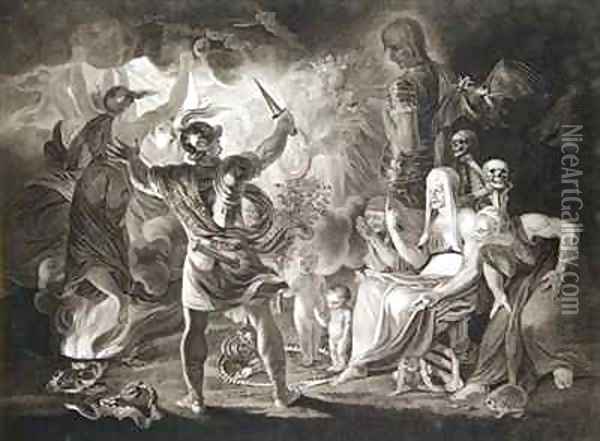William Shakespeare’s tragedy, Macbeth, is a timeless tale filled with prophecy, ambition, and eventual doom. Act IV of the play marks a pivotal moment where the fate of the protagonist, Macbeth, is foreshadowed through a crucial event. This event, the encounter with the apparitions summoned by the witches, serves as a haunting premonition of Macbeth’s downfall. As Macbeth delves deeper into his ruthless ambition and manipulative ways, this particular event in Act IV acts as a turning point that sets the stage for his tragic demise. Let’s delve deeper into the significance of this event and how it foretells the unraveling of Macbeth’s fate.
Introduction: Exploring Macbeth’s Downfall
In Shakespeare’s tragedy “Macbeth,” the titular character’s downfall is a central theme that captivates audiences even today. Act IV serves as a crucial turning point in Macbeth’s story, offering poignant insights into the events that foreshadow his ultimate demise.
Macbeth’s Ambition and Descent
As Macbeth’s ambition spirals out of control, he becomes increasingly consumed by his thirst for power, leading him on a path of betrayal and murder. The events in Act IV highlight his descent into darkness and moral decay, setting the stage for his tragic downfall.
This downward spiral ultimately culminates in Macbeth’s tragic end, showcasing the consequences of unchecked ambition and the corrupting nature of power in the play.
The Influence of the Witches’ Prophecies
The prophecies delivered by the witches in Act IV play a pivotal role in shaping Macbeth’s actions and decisions. These supernatural predictions profoundly impact Macbeth’s psyche, fueling his paranoia and driving him towards his inevitable downfall.
- The witches’ prophecies act as a catalyst for Macbeth’s descent into madness, blurring the lines between reality and illusion.
- Macbeth’s obsession with fulfilling the prophecies blinds him to the consequences of his actions, leading to his tragic undoing.

Overview of Act IV: Key Events Leading to Macbeth’s Fate
Act IV of Shakespeare’s ‘Macbeth’ is a pivotal section of the play that foreshadows the tragic fate awaiting the protagonist, Macbeth. One key event in Act IV that significantly contributes to Macbeth’s downfall is the encounter with the witches, also known as the ‘weird sisters’, who provide him with a series of prophecies that fuel his ambition and paranoia.
The Witches’ Prophecies
Upon meeting the witches in Act IV, Macbeth is informed of a series of apparitions that shape his future actions. The prophecies, including warnings about Macduff and Birnam Wood, manipulate Macbeth into making disastrous decisions that ultimately lead to his demise.
One particularly striking prophecy is the assurance that “none of woman born shall harm Macbeth.” This false sense of invincibility drives Macbeth to further tyranny and treachery.
The Murder of Macduff’s Family
Driven by fear and paranoia instigated by the witches’ prophecies, Macbeth orders the brutal murder of Macduff’s family in Act IV. This ruthless act not only solidifies Macbeth’s descent into darkness but also seals his fate as an irredeemable tyrant.
What event in Act IV foreshadows Macbeth’s eventual downfall is the culmination of these key events and choices made by the protagonist.
Analysis of the Foreshadowing Event
In Act IV of Macbeth, Shakespeare masterfully crafts a foreshadowing event that hints at the eventual downfall of Macbeth, the tragic hero. The pivotal scene in this act is the witches’ prophecy to Macbeth, where they conjure apparitions and warn him of potential threats.
Witches’ Prophecy
The witches’ prophecy plays a crucial role in foreshadowing Macbeth’s fate. They warn him to “Beware Macduff” and assure him that “none of woman born shall harm Macbeth.” This prophecy plants seeds of doubt and fear in Macbeth’s mind, leading him to take drastic measures to secure his throne.
This foreshadowing event sets in motion a series of tragic events that ultimately lead to Macbeth’s demise. The audience can sense the impending tragedy as Macbeth becomes increasingly paranoid and ruthless in his pursuit of power.
Macbeth’s Downfall
The foreshadowing event in Act IV serves as a warning sign of Macbeth’s downfall. His blind ambition and unwavering belief in the witches’ prophecies ultimately lead to his tragic end. Despite his initial success, Macbeth’s inability to see beyond his own desires results in his downfall.
Macbeth’s downfall is a cautionary tale that highlights the consequences of unchecked ambition and the dangers of relying on supernatural predictions.
Impact on Macbeth’s Character Development
Macbeth’s character experiences a significant transformation as he descends into madness and tyranny, driven by ambition and the witches’ prophecies. In Act IV of the play, the pivotal event that foreshadows Macbeth’s eventual downfall is his visit to the witches to seek further guidance, leading to his over-reliance on their deceptive prophecies.
Overconfidence and Hubris
As Macbeth becomes more entrenched in his pursuit of power, his overconfidence and hubris reach dangerous levels. He believes himself invincible due to the witches’ assurances, leading him to make reckless decisions without considering the consequences. This false sense of security ultimately seals his fate.
Paranoia and Isolation
Driven by his ambition and fear of losing the throne, Macbeth becomes increasingly paranoid and isolates himself from those around him. His trust in others diminishes, and he descends into a spiral of suspicion and betrayal, alienating even his closest allies.
Comparison with Previous Events
When exploring the event in Act IV that foreshadows Macbeth’s eventual downfall, it is essential to compare it with previous events in the play to understand the full scope of his tragic fate. In Act III, Macbeth becomes increasingly paranoid and ruthless, ordering the murder of Banquo and his son Fleance in his quest to secure his throne.
Macbeth’s Paranoid Behavior
This section delves into Macbeth’s descent into paranoia and tyranny following the witches’ prophecies. His willingness to eliminate anyone he perceives as a threat showcases his unraveling mental state and lust for power. This behavior sets the stage for his eventual downfall as he loses touch with reality and succumbs to madness.
Macbeth’s paranoia intensifies as he starts to see Banquo’s ghost during a banquet, revealing the psychological toll of his actions. This depiction of his inner turmoil and guilt foreshadows his ultimate demise.
Loss of Moral Compass
Another significant comparison can be drawn regarding Macbeth’s loss of a moral compass. In earlier events, Macbeth was depicted as a brave warrior with a sense of honor. However, his thirst for power corrupts him, leading to immoral deeds such as the murder of King Duncan and the innocent Lady Macduff and her children.
This gradual erosion of his ethical boundaries demonstrates how Macbeth’s character transforms from a noble figure to a ruthless tyrant hell-bent on maintaining his grip on power at any cost.

Frequently Asked Questions
-
- What event in Act IV of Macbeth foreshadows his downfall?
- In Act IV of Macbeth, the appearance of the apparitions to Macbeth leads to him making critical decisions that ultimately contribute to his downfall.
-
- How does the event in Act IV contribute to Macbeth’s fate?
- The event in Act IV, particularly the prophecies from the witches and the apparitions, deepens Macbeth’s sense of false security, leading him to make more ruthless choices that seal his fate.
-
- Is foreshadowing an important literary device used in Macbeth?
- Yes, foreshadowing plays a significant role in Macbeth as it helps build tension and anticipation by hinting at future events, particularly Macbeth’s tragic downfall.
-
- How does Act IV set the stage for the climax of Macbeth’s story?
- Act IV serves as a pivotal point in Macbeth’s narrative by introducing crucial elements that set the stage for the climactic events leading to his eventual downfall.
-
- What can readers learn from the foreshadowing in Act IV of Macbeth?
- Readers can learn about the consequences of unchecked ambition and the destructive nature of power through the foreshadowing in Act IV of Macbeth.
Unraveling Macbeth’s Destiny: The Foreboding Prophecy in Act IV
In conclusion, Macbeth’s fate is intricately woven into Act IV of the play, where the encounter with the witches and their prophecies serve as a pivotal moment foreshadowing his eventual downfall. The witches’ ominous predictions not only fuel Macbeth’s ambition but also plant the seeds of doubt and paranoia within him. The events in Act IV set in motion a chain of actions that ultimately lead to his demise, showcasing the power of fate and the consequences of unchecked ambition. As we delve deeper into the story of Macbeth, Act IV stands out as a compelling chapter that sets the stage for the tragic conclusion of Shakespeare’s iconic play.

